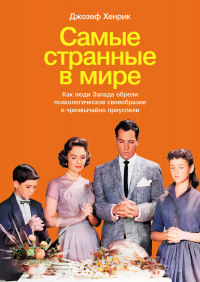Больше рецензий
9 марта 2024 г. 01:46
380
4 Крылья, ноги и хвосты
РецензияДаже и не упомню, встречалась ли мне раньше книга, при чтении которой я испытывала настолько сильную личную-неприязнь-даже-кушать-не-могу. Самой смешно и немного неловко.
Так-то это очередная попытка рассказать, почему Запад властвует ( по крайней мере, пока еще ). Хенрик объясняет это тем, что в результате культурной эволюции люди Запада (далее – «ЛЗ») приобрели уникальные психологические особенности, которые и позволили им стать замыкающим звеном пищевой цепи. Про «пищевую цепь» – это уже мое, как и баттхерт представителя эволюционно менее успешной внутривидовой группы. Сам же автор предельно корректен, старательно избегает любых намеков на white supremacism и термин «эволюция» использует не в метафорическом, а в строго-научном значении: процесс изменений случайного и ненаправленного характера. Просто повезло, короче.
Разве что в названии книги прорывается некоторое самодовольство – к сожалению, в русском переводе не воспроизводимое по объективным причинам. Для определения ЛЗ автор использует эпитет WEIRD – оно, конечно, «странные», скорее даже «стремные», вот только автор здесь не только кокэтничает, но и использует его как аббревиатуру: W(estern), E(ducated), I(ndustrialised), R(ich), D(emocratic) – западные, образованные, промышленно развитые, богатые и демократические. Нетакусики.
Бог с ними, моими проекциями и интерпретациями, перейдем к сути.
Что же стало тем фактором, который, по мнению автора, запустил культурную эволюцию ЛЗ именно в таком направлении? Ответ прост: Западная церковь – обратите внимание, не христианство как религия, а именно Церковь как институция. Причем не протестантская, с ее «протестантской этикой» по Веберу, а самая что ни на есть католическая. Начиная примерно с 500 года она целенаправленно проводила брачно-семейную политику, направленную на разрушение кланово-родового общества, или, в терминологии автора, интенсивного родства, – через запрет близко- и даже дальнеродственных браков и многоженства, – преследуя, разумеется, не «эволюционные», а вполне себе прагматические цели: тезис «враги человеку – домашние его» ровно с теми же намерениями в наше время педалируют тоталитарные секты. И примерно через тысячу лет, то есть аккурат к началу Нового времени, в Европе нормой стала моногамная нуклеарная и неолокальная семья с более поздним, по сравнению с «традиционными обществами», вступлением в брак, меньшим количеством детей и в целом гораздо более низким уровнем внутригрупповой солидарности и внутригрупповой преданности. В результате:
Популяции, которые дальше находились под влиянием западной Церкви, как правило (А) менее жестко регулируются нормами, (Б) менее склонны к конформности, (В) менее склонны следовать традициям, (Г) более индивидуалистичны, (Д) менее недоверчивы к незнакомцам, (Е) больше руководствуются универсальной моралью, (Ж) более склонны к кооперации с незнакомцами, (З) более восприимчивы к наказанию, осуществляемому третьими лицам, (И) больше склонны к добровольной сдаче крови, (К) проявляют большую обобщенную честность (по отношению к обезличенным институтам), (Л) менее склонны к накоплению штрафов за парковку в условиях дипломатической неприкосновенности и (М) обладают более аналитическим складом ума.
что привело к созданию инклюзивных демократических институтов, которые, в свою очередь, дали ЛЗ значительные преимущества в межгрупповой конкуренции, прежде всего за счет развития коллективного мозга, по мощности превосходящего коллективные мозги любых других популяций.
Уточним:
Конечно, тут имеют значение многие экономические и географические факторы, но если в рецепте коллективного мозга Европы и есть секретный ингредиент, то это психологический набор из индивидуализма, аналитической ориентации, мышления на основе игр с положительной суммой и обобщенной просоциальности, который формировался на протяжении веков.
Нужно отдать должное автору: все свои утверждения он строит на реалиях, буквально заваливая читателя ссылками на исторические документы, результатами социологических исследований, описаниями психологических экспериментов, данными опросов, статистикой, графиками, схемами и таблицами. Будучи полным профаном в культурной антропологии и социальной психологии, я не в состоянии оценить валидность предложенных материалов и тем более сделанных на их основе выводов, поэтому… не буду повторяться, см. первое предложение отзыва.
Несмотря на провокативность (или благодаря ей?), книга читается с большим интересом. Автор остроумен, (само)ироничен, излагает свои гипотезы с легкостью, не переходящей в легковесность. Да и сама возможность посмотреть на историю человечества под необычным для себя углом дорогого стоит. Но с неменьшим интересом я бы почитала критический разбор его построений – в идеале от представителей той же научной школы и, разумеется, WEIRD.
Кстати, в лучших традициях западной научной мысли Хенрик в очень сжатой форме излагает свою теорию и даже визуализирует ее в блок-схеме «основных процессов» в самой последней главе, «Темная материя истории», и, если лениво читать 600-страничный труд целиком, но хочется получить общее впечатление, можно ограничиться ею.



Комментарии
Любопытная книга) по поводу католичества интересное мнение, почему автору протестантское меньше нравится?
Как раз на днях читала про сложности абортов в Ирландии, там сравнивали Северную Ирландию с Англией и там где сильнее католицизм, там меньше прав у женщин.
Правда в 2018 году отменили поправку, которая приравнивала жизнь плода и матери
С этими абортами и у протестантов беда (overturned Roe vs Wade). Не знаю, чем они им так не угодили. Не могу поверить, что современные люди могут быть такими безнадёжно верящими в того-кого-никто-никогда-не-видел, чтобы не делать себе удобно. Убивают же они, посылая войска, обычные и атомные бомбы в разные страны, вполне комфортно и без проблем – поэтому я ищу в запрете абортов рациональное зерно. Пока не нашла.
Беда, не спорю. Про войны да,нелогично, в книге которую выше цитирую это удивление тоже приводится. Там встретила такое объяснение
Потому что оно было позже)) и, по мнению автора, стало всего лишь логическим оформлением тех самых изменений в психике, которые закрепились в популяции благодаря брачно-семейной политике церкви в 500-1500 годах
Но ведь православие появилось ещё раньше католичества. Что там у него про это сказано?
Кроме того, прочитала в одной из рецензий на Амазоне, что
Нет, с чего бы. Единая христианская церковь разделилась на Западную (римскую) и Православную (византийскую) в результате раскола 1054 года.
Хенрик утверждает, что в православной церкви отношение к родственным бракам, наоборот, было менее строгим
Католическая же откололась от Византийской.
Не, они взаимно предали друг друга анафеме.
А читала
и
Кантора начинала, но не пошел. Цивилизация давно отложена — интересная, стоит подвинуть выше в списке на чтение?
У меня Цивилизация не пошла, на мой взгляд, это публицистика, а не наука. Но очень многим нравится. Мне хорошо зашла
Спасибо, посмотрю
Прекрасная рецензия! А первое упоминание фамилии автора в рецензии - это "опечатка по Фрейду" или художественный приём?
Черт (( Не, просто опечатка в ночи. Коверканье фамилий - не наш стиль!
И, кстати, я немного не понял как в одном "психологическом наборе" сочетаются с одной стороны - индивидуализм, а с другой - игры с положительной суммой и обобщённая просоциальность? Или я как-то иначе, чем автор, понимаю эту социальность?
ну а что вы хотите, ЛЗ же уникальные )
Если серьезно (и если я правильно поняла), под индивидуализмом имеется в виду не эгоизм, а "отделенность" - отсутствие с одной стороны защиты, а с другой - давления рода. Поэтому пришлось учиться сотрудничеству со всеми, вместо того чтобы конформно подстраиваться под семейные традиции. По ХеНРику, в основе процветания ЛЗ - добровольные объединения на основе формализованных норм.
И всё-таки, уж не сочтите за занудство :). То, что у ЛЗ произошло отделение/отдаление от родственно-общинных (более характерных для востока) связей, я понял. И в этом (в том числе в этом) - индивидуализм (в терминологии автора). Но в чём суть добровольных объединений, да ещё на основе формализованных норм (в этом ведь расшифровка термина обобщённая просоциальность?)? Нет ли в книге примера таких объединений? Речь идёт о гильдиях и профсоюзах? Или о том, что ЛЗ чувствуют некое единство по отношению к Не-ЛЗ? В качестве второго или хотел написать "единство идеологии (в широком смысле) и взглядов", но это вряд ли возможно: ведь общество ЛЗ декларирует всяческий плюрализм.
Я не Рабинович )), поэтому длинная цитата
Добровольные объединения - да, торговые гильдии, вольные города, университеты как ранние примеры. Потом - политические партии, профсоюзы, акционерные общества. В общем случае - "социальные структуры, основанные на общих интересах или убеждениях, а не на родстве или племенной принадлежности".
Фишка именно в том, что в отличие от традиционных обществ, где человек с рождения и по умолчанию находится в некотором коконе социальных связей, ЛЗ вынуждены строить такие связи каждый раз самостоятельно. В результате сформировался такой "уникальный набор психических особенностей".
Про взаимодействие ЛЗ с не-ЛЗ автору не особо интересно. Разве что в конце упоминает, что попытки насаждения западных ценностей в обществах, построенных на иных психологических принципах, редко оказываются успешными. Но это мы и так знаем.
Спасибо. Очень любопытно. И очень спорно. Например: "Принципы беспристрастности важнее ситуативных предпочтений". В переводе на русский это звучит так: "Справедливость выше милосердия". Точная антитеза христианству. Но автора, насколько я понял, не очень интересует христианство.
А "уникальный набор психических особенностей" сразу напомнил мне "уникальную английскую самобытность" (см. Кейт Фокс - Наблюдая за англичанами. Скрытые правила поведения ) :))
А мне показалось, что принципы беспристрастности важнее ситуативных предпочтений – это о том, что справедливость важнее прагматичной реальной политики. Но ведь то совсем не то, чем руководствуются ЛЗ.
Не берусь интерпретировать автора - вопросы терминологии и вкладываемых в нее смыслов вообще штука сложная. Но, например, тему беспристрастности он демонстрирует на примере "дилеммы пассажира": если ваш друг ехал с превышением скорости и сбил человека, вы - единственный свидетель. Подтвердите ли вы под присягой, что он не превышал скорость? Если нет - вы человек Запада.
В странах не-Запада
Там в принципе шок-контента хватает. Уверяю вас, у меня регулярно подгорало не просто так)
Очень интересно! Прочитаю-ка я эту книгу на английском. Я не стала её читать, поскольку начало показалось скучным. Сейчас думаю, что зря.
Про беспристрастность уже написала, а что имеется в виду под упором на психические состояния?
Про
даже читать невозможно без жгучего, острейшего ощущения испанского стыда. Меня столько раз ЛЗ обманывали в переговорах, прежде чем я взяла за правило не доверять ни одному их слову, что я не могу спокойно видеть эту ложь. Да, обыватели ЛЗ доверчивы и относительно справедливы (в соответствии с их весьма оригинальным понятием о справедливости, впрочем), но ЛЗ, интеллектуально хотя бы слегка выше среднего – отъявленные злодеи, с которыми лучше не сталкиваться, не рискуя остаться без оторванных на ходу подмёток.
ЛЗ разные, как и мы все)) Для финнов, с которыми я на ежедневной основе сотрудничала и просто общалась всю сознательную жизнь, это так.
Про психические состояния - это то, что в уголовном праве называется субъективная сторона преступления (вина, мотив, цель, эмоциональное состояние в момент преступления...)
А книгу почитайте, она и правда занятная. И ооочень дискуссионная
Вот такую ещё рецензию увидела, где человек фейспалмит по поводу беспристрастности ЛЗ по отношению к не-ЛЗ, которую автор провозглашает истиной.
Почитала ещё рецензий, поняла, что этот Вася – профан, поэтому оставлю его в недочитанных всё же :)
Спасибо. У меня тоже "исторически-брачная" фактология книги вызвала больше всего вопросов. Но я ни разу не специалист в Средневековье, поэтому презюмировала исследовательскую добросовестность Хенрика. Да и список ссылочной литературы у него внушительный.
Но и эту рецензию не могу принять без вопросов. При чем тут Римская империя и ее законы? 1800 - это уже Промышленная революция, а рост Европы - как минимум с начала Великих географических открытий. При чем тут "страны"? Нации и страны (тем более в современных границах) - продукт Новейшего времени, а, по Хенрику, психологические особенности сформировались уже к 1500 году.
Особенно задело вот это:
В смысле? То, что "настоящим" считался только брак, освященный церковью, со всеми вытекающими из этого наследственными и прочими юридическими вопросами, не подлежит сомнению. И то, что церкви понадобилась тысяча лет, чтобы разрушить старые порядки, Хенрик говорит многократно.
И, при всей моей предвзятости, чего-чего, а разговоров о моральном превосходстве у Хенрика нет. Он не самоубийца в конце концов)
Короче, вопросов очень много. Ко всем
Хех, я в итоге так поняла, что он из тех, кто издаётся в «Алгоритме» :)
Да, кстати, вспомнила! Про причины преуспеяния западной цивилизации по-научному рассказывает вот этот труд
В точку попала) Так получилось, что я параллельно читала две книги: Хенрика, который все объясняет через "психологию" - и мне у него, помимо прочих претензий, страшно не хватало "экономики", и книжку по истории России через призму мир-системного анализа. Там, наоборот, исключительно money makes the world go round. Нет в мире гармонии!
Возможно, дело в том, что в психологии любой может развернуться, даже самый альтернативно одарённый… )))
Да, и фальсифицируемостью у психологических теорий большие проблемы...